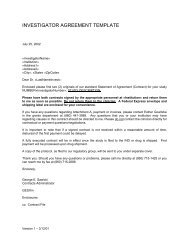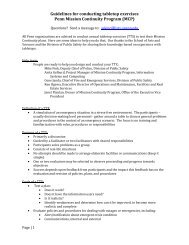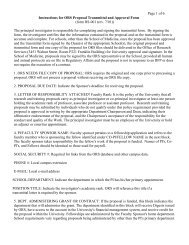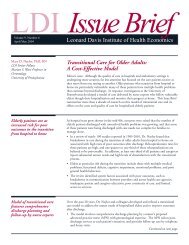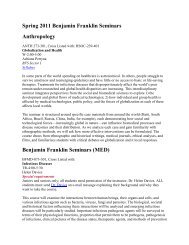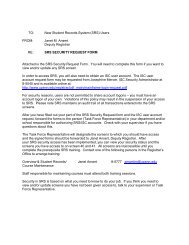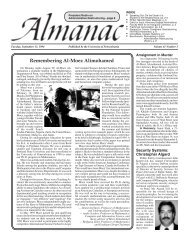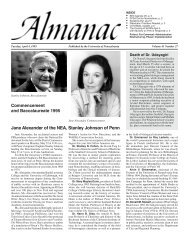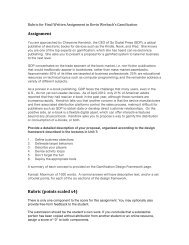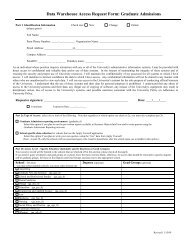PENNPRINTOUT - University of Pennsylvania
PENNPRINTOUT - University of Pennsylvania
PENNPRINTOUT - University of Pennsylvania
You also want an ePaper? Increase the reach of your titles
YUMPU automatically turns print PDFs into web optimized ePapers that Google loves.
Overall, 16 percent <strong>of</strong> students said they use computers<br />
intensively, 41 percent reported frequent use, 38<br />
percent occasional use, and 5 percent never use them.<br />
These percentages did not differ substantially between<br />
ResNet and other residences.<br />
A total 54 percent <strong>of</strong> ResNet students indicated that<br />
availability <strong>of</strong> ResNet services affected their room selection<br />
this year, as compared to 13 percent <strong>of</strong> those not in<br />
ResNet; 49 percent <strong>of</strong> the freshman, sophomores, and<br />
juniors in both ResNet and non-ResNet buildings agreed<br />
that ResNet will affect next year’s housing selection.<br />
In ResNet, 68 percent reported owning a computer<br />
(53 percent desktop and 15 percent laptop) compared to<br />
62 percent non-ResNet (46 percent desktop, 16 percent<br />
laptop); 44 percent in ResNet reported sharing computing<br />
equipment with roommates versus 20 percent in other<br />
buildings. Reflecting this greater in-room access, ResNet<br />
students report less use <strong>of</strong> residence labs (12 vs. 22<br />
percent) and School/Library labs (17 vs. 21 percent) for<br />
their primary computing.<br />
An important finding is that 22 percent <strong>of</strong> ResNet<br />
students use a modem (vs. 45 percent outside ResNet).<br />
Further study is required to determine if ResNet modem<br />
use, which is discouraged, is due to the cost <strong>of</strong> Ethernet<br />
hardware, perceived complexity <strong>of</strong> Ethernet s<strong>of</strong>tware<br />
installation, requirement for access to external bulletin<br />
boards not accessible via the Internet, or other factors.<br />
In general, ResNet students make more use <strong>of</strong> network<br />
resources (although note that in Table II on page 9, “library<br />
use” was defined to mean network access to library<br />
resources from outside libraries).<br />
Television<br />
Although about 53 percent <strong>of</strong> all students reported<br />
owning televisions, 34 percent <strong>of</strong> ResNet students had<br />
access to roommates’ sets, compared to 17 percent in non-<br />
ResNet buildings. Additionally, more ResNet students<br />
reported owning VCRs (36 vs. 27 percent). Reflecting<br />
both greater access to televisions and greater channel<br />
selection, ResNet students spend more time watching TV<br />
each week (15 percent watch over 14 hours; 47 percent<br />
watch from 5 to 14 hours; vs. 9 percent and 36 percent,<br />
respectively), and more frequently (“almost always” plus<br />
“frequently,” as opposed to “sometimes” or “never”) watch<br />
news (26 vs. 15 percent), sports (55 vs. 38 percent), the<br />
ResNet movie channel (51 vs. 7 percent), and foreign<br />
language programming (10 vs. 4 percent). The overall<br />
percentage <strong>of</strong> students reporting use <strong>of</strong> television for<br />
assignments was 12 percent.<br />
Telephones<br />
In ResNet buildings, 605 students reported that they<br />
opted to have a private telephone line installed, compared<br />
to 15 students in other residences.<br />
10<br />
Act<br />
“Bottom<br />
now<br />
line”<br />
and<br />
questions<br />
save!<br />
Nine percent <strong>of</strong> ResNet students agreed that availability<br />
<strong>of</strong> ResNet services influenced their decision to attend<br />
Penn, compared to six percent <strong>of</strong> students in other buildings.<br />
When asked if ResNet had contributed to their<br />
academic experience, 76 percent in ResNet agreed vs. 26<br />
percent in other buildings. Regarding ResNet’s positive<br />
contribution to the quality <strong>of</strong> life at Penn, 87 percent in<br />
ResNet agreed, compared to 37 percent <strong>of</strong> students living<br />
elsewhere.<br />
Looking forward, 57 percent in ResNet agreed that<br />
the services would help with future work goals (vs. 40<br />
percent), 47 percent agreed that availability <strong>of</strong> ResNet-type<br />
services could influence their choice <strong>of</strong> graduate schools<br />
(vs. 30 percent), and, as noted above, 49 percent <strong>of</strong><br />
freshman, sophomores, and juniors in both ResNet and<br />
non-ResNet buildings agreed that ResNet would influence<br />
their choice <strong>of</strong> residence next year.<br />
Some observations<br />
It is important to note that ResNet is an investment in<br />
“deep infrastructure” to support emerging changes in the<br />
way Penn carries out teaching and learning as well as<br />
changes in the role <strong>of</strong> on-campus residences in the<br />
academic and social life <strong>of</strong> the campus. It appears that the<br />
<strong>University</strong> launched ResNet at the ideal time to leverage<br />
the explosive growth <strong>of</strong> scholarly interest in the Internet.<br />
Nevertheless, since ResNet is only half finished—and, in<br />
particular, since very few freshman or graduate/pr<strong>of</strong>essional<br />
rooms are wired—the full value <strong>of</strong> ResNet will not<br />
be apparent for several years.<br />
Nettlesome issues remain, however. We need a better<br />
understanding <strong>of</strong> some students’ preferences for modem<br />
use over Ethernet, and (potentially related) better understanding<br />
<strong>of</strong> how to accommodate the 15 percent <strong>of</strong><br />
students with laptop computers. For example, in academic<br />
buildings there are few ports available to attach an<br />
Ethernet-ready laptop. We also have evidence that our<br />
network acceptable use policy will have to be adapted—<br />
and enforced—as new uses and abuses are discovered.<br />
Finally, our biggest challenge is likely to be providing<br />
students who don’t live in the residence halls with costeffective<br />
access to data networking services equivalent to<br />
those available to ResNet students. This remote access is<br />
equally important to faculty and staff from their homes as<br />
networked computing becomes a key component in the<br />
way people live, learn, teach, and work at Penn.<br />
DANIEL A. UPDEGROVE, Associate Vice Provost for<br />
Information Systems and Computing, co-chairs the ResNet<br />
Steering Committee; GEORGE P. McKENNA, Director <strong>of</strong><br />
Network Operations and Engineering in Data Communications<br />
and Computing Services, chaired the ResNet<br />
evaluation sub-committee.<br />
<strong>PENNPRINTOUT</strong>




